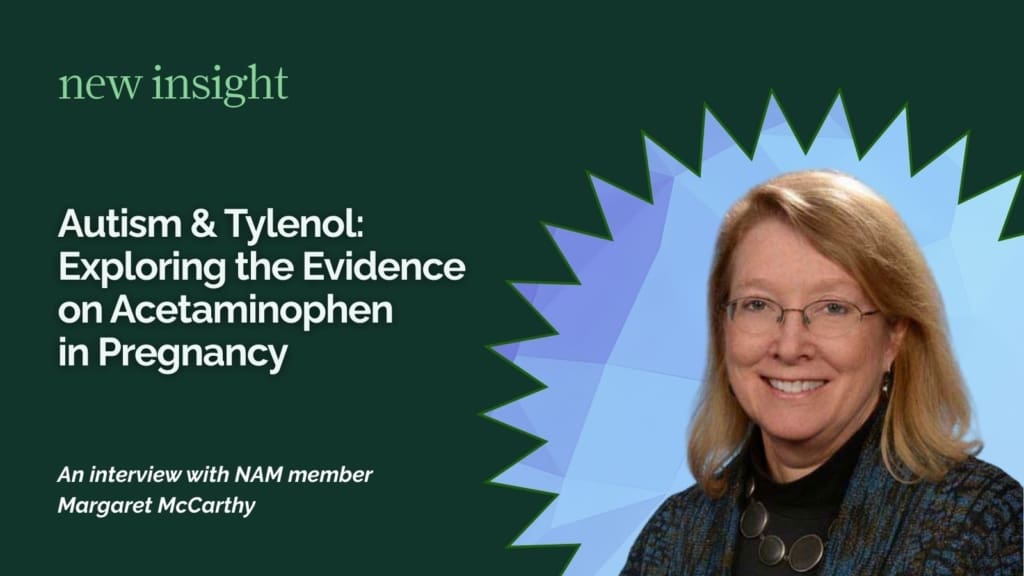Margaret McCarthy discusses the genetics of autism, how to interpret associations in health studies, and why medical guidance matters.
Recently, the U.S. Food and Drug Administration (FDA) issued a notice that physicians should minimize patients’ use of acetaminophen (the active ingredient in Tylenol) during pregnancy, citing a possible association with increased risk for autism and other neurological conditions in children. Association is not the same as causation, and the FDA stressed that a causal relationship has not been established. Currently, acetaminophen is considered by OB-GYNs to be a safe over-the-counter pain reliever and fever reducer for pregnant women.
We discussed the research behind the FDA’s announcement with Margaret McCarthy, PhD, an NAM member and neuroscientist studying early brain development at the University of Maryland.
This interview has been edited for length and clarity.
What’s your background with regard to autism, brain development, and the impacts of drugs like acetaminophen?
McCarthy: I’m a basic science researcher using animal models. I study how the brain develops differently in males and females. Given how many more males are diagnosed with autism than females, understanding the origins of autism has always been central to my work. Years ago, we made the surprising discovery that prostaglandins (a type of fatty acid), play an important role in male brain development. Over-the-counter drugs like acetaminophen and ibuprofen inhibit the synthesis of prostaglandins to different degrees.
What does scientific research currently tell us about the causes of autism?
McCarthy: The overwhelming consensus is that it’s a genetic disease. Usually when people hear the term “genetic disease,” they think about something inherited, like Huntington’s disease or the BRCA1 gene for breast cancer. But autism, in a majority of cases, involves a mutation in a gene that is central to brain function. There are hundreds of genes that can cause autism. But not everyone with a mutation in those genes will have autism – the penetrance is very variable. So, we think there’s some interplay with the environment, and there’s clearly something different about young males that makes them more susceptible.
With a genetic disease like autism, there’s the concept of a “double hit.” You might have a gene mutation that gets you close to the threshold for autism, and then you experience another “insult” (medical event or environmental exposure) that confounds it and pushes you over the line. It’s still a very active area of research.
There is an ongoing debate over why diagnoses of autism are increasing in the United States. What’s your perspective?
McCarthy: Autism diagnoses are increasing because we’ve become more aware of it and more people are seeking diagnoses, which are also more available. People want a diagnosis because that enables them to get early intervention. They love their children and want to get them help.
You may have heard that there are higher rates of autism in cities. But actually, that’s because there is more testing in cities and more special programs and resources for kids with autism, so families are moving there for support.
We’ve just gotten much, much better at recognizing autism. When I was a kid, there was very little autism. But we had a different term, which we don’t use anymore, for people with neurodevelopmental challenges. So, there really isn’t a crisis out there driving higher rates of autism. It’s more about increased awareness and people seeking out testing.
What research exists on the possible association between autism and use of acetaminophen during pregnancy?
McCarthy: There was a recent meta-analysis that looked at 46 studies on the relationship between acetaminophen use and neurodevelopmental disorders like autism. Some of these studies found an association but none of them found a causal link.
When you hear about an “association,” you have to account for other variables that may be involved. The number one thing to remember is that women who take a lot of acetaminophen during pregnancy are doing it for a reason. It’s not a recreational drug, right? They’re taking it because something’s wrong. It could be fever, it could be inflammation, it could be severe pain. Fever, maternal inflammation, and immune system activation are all very dangerous for the developing fetus. These other factors could be what leads to increased risk for autism, not the acetaminophen itself.
Everyone is always saying we need to do more studies. But the problem is we are never going to be able to do a formal experiment on pregnant women. We’re stuck with these messy “associations.”
After 46 studies in a meta-analysis, this should really be considered “settled science.” If there is a risk, it’s a small one. Prevention is important, but we should also be putting effort toward intervention. We should be studying the best pharmaceutical and behavioral therapies. Are there better early interventions? Could transcranial magnetic stimulation work? Virtual reality? There are a lot of people with autism right now who need help.
Your own research has shown that over-the-counter drugs affect fetal brain activity in some way. How should we interpret the risk of taking these drugs?
McCarthy: That’s a fair statement. But remember that we could substitute over-the-counter drugs for a million other things. Thyroid insufficiency, air pollution, microplastics, PFAS. Another useful example is polycystic ovarian syndrome (PCOS). Women with PCOS have high amounts of androgens (male hormones), and they also have a higher risk of having children with autism. So, it’s tempting to jump to the conclusion that androgens may interplay with genetic factors to cause autism. But women with PCOS also have higher rates of insulin resistance and obesity and all sorts of other factors that are also known to be contributors. So, what is it? Again, it’s a matter of being too quick to attribute causation to one variable when there are so many other variables in play.
What advice do you have for pregnant women trying to navigate this complex subject?
McCarthy: If you are suffering a high fever during pregnancy, don’t tough it out. That’s not the right answer. It’s very dangerous to have a high fever, for both you and the fetus. There are heat shock proteins that get turned on at the wrong time and can actually be teratogenic and cause fetal anomalies.
Talk to your doctor. Your doctor knows your overall health. They know your risk factors, your complete medical history. A large epidemiological study can’t come close to that.
Disclaimer: The information provided in this article is for informational purposes only and is not intended as a substitute for professional medical advice, diagnosis, or treatment. Always seek the advice of your physician or other qualified health care provider with any questions you may have regarding a medical condition.


